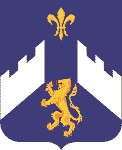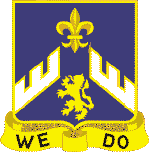363rd (Infantry) Regiment, US Army: Difference between revisions
Knorrepoes (talk | contribs) m (Text replacement - "↵↵↵Literature" to " Literature") |
Knorrepoes (talk | contribs) m (Text replacement - "Category: " to "Category:") |
||
| Line 26: | Line 26: | ||
[[Category:Military heraldry of the United States]] | [[Category:Military heraldry of the United States]] | ||
[[Category:Army heraldry]] | [[Category:Army heraldry]] | ||
[[Category: Granted 1927]] | [[Category:Granted 1927]] | ||
Revision as of 08:59, 15 October 2023
363RD (INFANTRY) REGIMENT, US ARMY
| (Coat of Arms) |
(Distinctive Unit Insignia) |
Official blazon
Shield: Azure, on a chevron raguly to chief Argent, between a fleur-de-lis and a lion rampant Or, a pale of the field.
Crest: That for the regiments and separate battalions of the Army Reserve: On a wreath of the colors Argent and Azure the Lexington Minute Man Proper. The statue of the Minute Man, Captain John Parker (H.H. Kitson, sculptor) stands on the Common in Lexington, Massachusetts.
Motto: WE DO.
Distinctive Unit Insignia. Description: A gold color metal and enamel device 1 1/8 inches (2.86cm) in height overall consisting of a shield blazoned: Azure, on a chevron raguly to chief Argent, between a fleur-de-lis and a lion rampant Or, a pale of the field. Attached below the shield a gold scroll inscribed "WE DO" in black letters.
Origin/meaning
The shield is blue for Infantry. The chevron broken in the middle with the upper side raguly represents the broken Hindenburg Line; the fleur-de-lis symbolizes service in France; and the lion rampant, service in Belgium.
The Coat of Arms and Distinctive Unit Insignia was originally approved for the 363d Regiment Infantry on 10 February 1927. They was redesignated for the 363d Regiment on 24 Jan 1962. Literature: Images from Wikimedia Commons. Information from The Institute of Heraldry, US Army.

